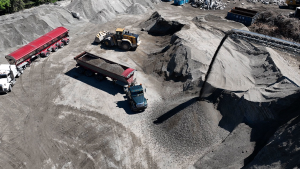Less red tape.
That was the general consensus at a recent panel held at the Riverway Clubhouse.
The discussion centered on findings from a recent report released by Procore: How We Build Now.
Moderated by Kimberly Corlett, Field Marketing manager at Procore Technologies, the panel featured Seema Lal, president of Canadian Construction Women; Chris Gardner, president of the Independent Contractors and Businesses Association (ICBA); and Piero Iamartino, founder and director of Construction at Tino Mechanical.
The report, based on data from a survey conducted by independent research company Censuswide, gathered insights from 502 Canadian construction decision-makers and influencers. It delved into various aspects of the industry, including its overall sentiment, the digital maturity and adoption of construction technologies, and the challenges and opportunities faced by businesses.
While there were many noteworthy insights from the survey, one stat seemed to stand out and really capture the attention of the panellists. That was 90 per cent of respondents expressed confidence in the Canadian construction market’s future.
This statistic set the stage for a discussion about the industry’s current dynamics and future prospects.
Shift in focus
This level of confidence, as revealed by the survey, is a testament to the industry’s resilience, especially in the face of challenges like rising interest rates and a noticeable slowdown in construction activity, the panellists highlighted.
They explored critical themes that are shaping the Canadian construction landscape, with a particular emphasis on addressing regulatory hurdles and streamlining the approval process.
Gardner’s call to “unleash the private sector” reverberated in the discussion, particularly when addressing the housing crisis in British Columbia.
He expressed concerns about the reduced number of homes slated to be built in B.C. this year. “Why can’t we move the needle on supply? The answer is partly finger-pointing on all levels of government – city hall, the province, Ottawa – all those governments have to understand that we all have to work together. We have to work together with the private sector to build more supply. If we don’t build more supply, we are not going to put a dent in affordable housing. It’s as simple as that.”
While agreeing with Gardner’s sentiment, Lal expressed a more measured opinion.
After the panel, she elaborated on her approach.
“I was trying to play a little bit of devil’s advocate to Chris’s position because I’m a lawyer by day,” she says. “I think less red tape is absolutely part of the solution, but I think we need to do it in a little bit of an intentional and planned way to make sure we’re not losing sight of some of those other important priorities.”
Concerns beyond housing
Gardner’s concerns extended beyond the housing crisis to the broader construction industry, which he warned “the chickens are coming home to roost.”
His foreboding message stems from the impending completion of four significant energy mega-projects, the Site C dam, the Trans Mountain pipeline expansion, LNG Canada and the Coastal GasLink pipeline, which have been under construction since 2019 and have a cumulative capital spend estimated at around $100 billion.
Gardner raised a critical question: When these wrap up, then what?
“It’s all going to be winding down in 2024/2025 and there’s nothing on the horizon of that scale,” he warned.
He emphasized the need for Canada to compete in a global marketplace and urged for a more efficient project approval processes.
“Canada has great opportunities, but we are in a competitive marketplace globally. We have to move faster,” Gardner asserted. “Nobody is saying we shouldn’t have robust environmental standards, we should. But let’s give investors some certainty. It will take two years to approve your project. Review it. You’re either going to get a yes or a no, but it’s going to take two years.”
During the discussion, various other topics were addressed, reflecting the multifaceted challenges in the construction sector. Issues explored included mental health awareness and the need to create a more welcoming environment for visible minorities and women.
For example, on the hot topic of providing toilet facilities specifically for women, Lal, shared her observations of seeing more pink porta potties on construction sites but she says we still have a long way to go.
“I am cautiously optimistic,” she says. “But I think we’ve got to pick up the pace a little bit.”










Recent Comments